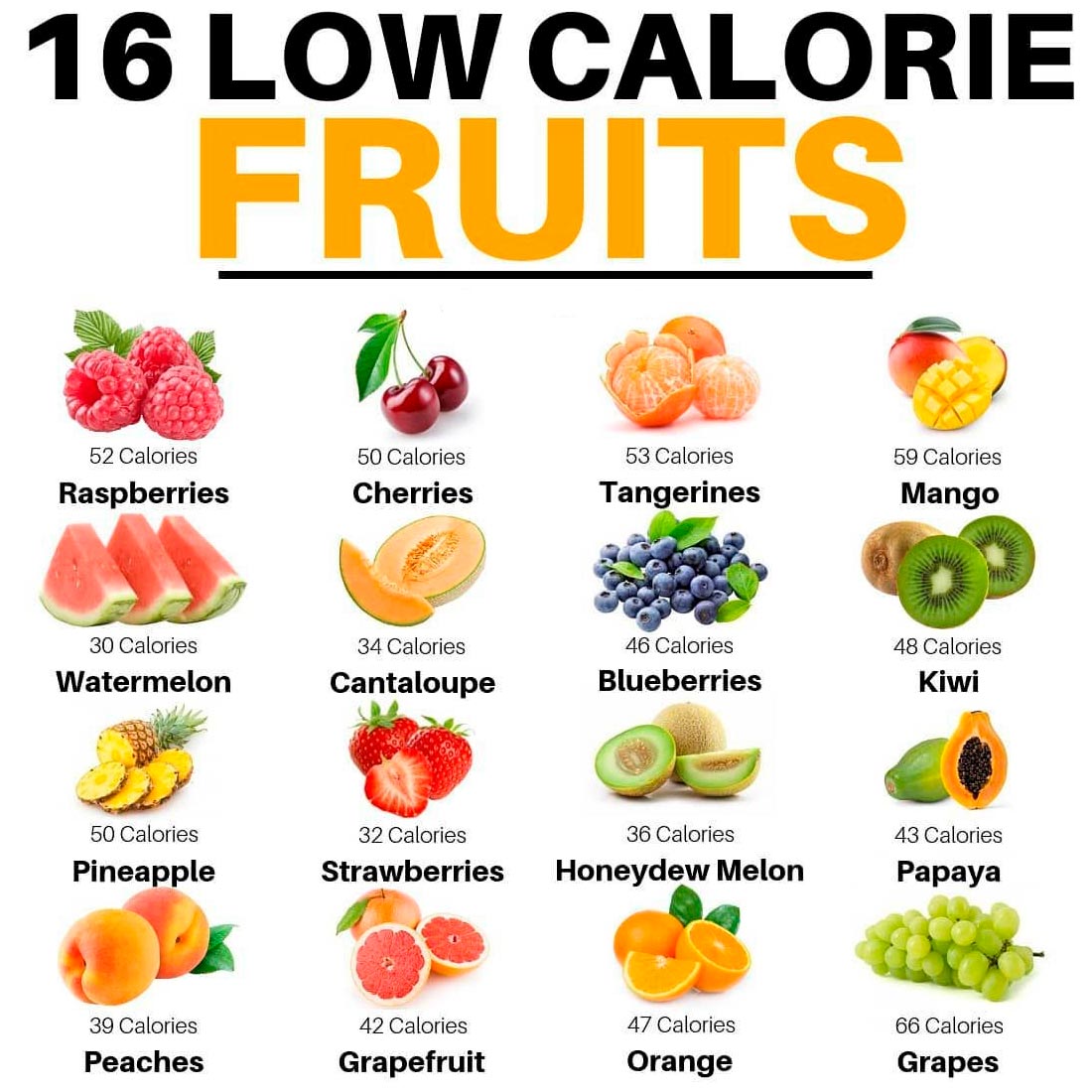Low calorie fruits are a great option for those looking to maintain a healthy diet while still satisfying their sweet tooth. With so many options available, it can be difficult to know which fruits are the best to choose.
Table of Contents
This article will explore some of the top low calorie fruits and provide information on their nutritional benefits.
Fruits are an essential part of a balanced diet, providing a wide range of vital nutrients such as vitamins, minerals, fiber, and antioxidants. However, for individuals aiming to maintain controlled calorie intake or lose weight, it's important to be aware of fruits with low calorie content.
One of the best low calorie fruits to include in your diet is berries. Berries are packed with antioxidants and are low in calories, making them a great choice for anyone looking to maintain a healthy weight. Blueberries, raspberries, and strawberries are all great options to add to your diet.
Another low calorie fruit that is often overlooked is the kiwi. Kiwis are a great source of vitamin C and fiber, and are also low in calories. In fact, one medium-sized kiwi contains just 61 calories. Kiwis are also a great source of potassium, which can help regulate blood pressure and reduce the risk of heart disease.
Understanding Low Calorie Fruits
Low calorie fruits are a great addition to any diet, especially for those who are looking to lose weight or maintain a healthy weight. These fruits are low in calories, which means that they can be eaten in larger quantities without the risk of consuming too many calories.
Some of the most popular low calorie fruits include berries, watermelon, cantaloupe, grapefruit, and papaya. These fruits are not only low in calories, but they are also packed with vitamins, minerals, and antioxidants that are essential for good health.
When selecting low calorie fruits, it is important to pay attention to the serving size and the calorie content. While most low calorie fruits are low in calories, some can be higher in calories than others. For example, a cup of grapes contains around 60 calories, while a cup of cherries contains around 90 calories.
It is also important to note that while low calorie fruits are a healthy addition to any diet, they should not be the only source of nutrition. It is important to consume a variety of fruits and vegetables to ensure that the body is getting all of the nutrients it needs.
Overall, low calorie fruits are a great way to add variety to a healthy diet while still maintaining a calorie deficit. By incorporating these fruits into meals and snacks, individuals can enjoy the benefits of a healthy diet without sacrificing taste or satisfaction.

Benefits of Low Calorie Fruits
Low calorie fruits are an excellent addition to any diet. They provide a range of health benefits while being low in calories, making them an ideal choice for those who want to lose weight or maintain a healthy weight. Here are some of the benefits of low calorie fruits:
1. High in Fiber
Low calorie fruits are high in fiber, which is essential for maintaining a healthy digestive system. Fiber helps to regulate bowel movements, prevent constipation, and reduce the risk of colon cancer. It also helps to keep you feeling full for longer, which can aid in weight loss.
2. Packed with Vitamins and Minerals
Low calorie fruits are packed with essential vitamins and minerals that are necessary for good health. For example, citrus fruits such as oranges and grapefruits are high in vitamin C, which helps to boost the immune system and protect against colds and flu. Berries, such as blueberries and strawberries, are high in antioxidants, which help to protect against cancer and heart disease.
3. Low in Sugar
Low calorie fruits are naturally low in sugar, which makes them an ideal choice for those who are watching their sugar intake. This is important because consuming too much sugar can lead to weight gain, diabetes, and other health problems.
4. Versatile
Low calorie fruits are versatile and can be eaten in a variety of ways. They can be eaten as a snack, added to salads, used in smoothies, or used to make desserts. This makes it easy to incorporate them into your diet and enjoy their health benefits.
List of Low Calorie Fruits
Berries
Berries are a great option for those looking for low-calorie fruits. They are packed with antioxidants and other nutrients and are perfect for snacking or adding to meals. Some of the most popular low-calorie berries include:
- Strawberries: 1 cup of strawberries contains only 49 calories.
- Blueberries: 1 cup of blueberries contains only 84 calories.
- Raspberries: 1 cup of raspberries contains only 64 calories.
- Blackberries: 1 cup of blackberries contains only 62 calories.
Citrus Fruits
Citrus fruits are not only low in calories but also high in vitamin C, which is essential for a healthy immune system. Some of the most popular low-calorie citrus fruits include:
- Grapefruit: 1/2 grapefruit contains only 52 calories.
- Oranges: 1 medium orange contains only 62 calories.
- Tangerines: 1 medium tangerine contains only 47 calories.
- Lemons: 1 medium lemon contains only 24 calories.
Melons
Melons are a refreshing and low-calorie fruit option that are perfect for hot summer days. Some of the most popular low-calorie melons include:
- Watermelon: 1 cup of diced watermelon contains only 46 calories.
- Cantaloupe: 1 cup of diced cantaloupe contains only 53 calories.
- Honeydew: 1 cup of diced honeydew contains only 64 calories.
Peaches
Peaches are a delicious and low-calorie fruit that are perfect for snacking or adding to meals. One medium-sized peach contains only 58 calories.
Pineapples
Pineapples are a tropical and low-calorie fruit that are perfect for adding to smoothies or as a snack. One cup of diced pineapple contains only 82 calories.
Apples
Apples are a classic and low-calorie fruit that are perfect for snacking or adding to meals. One medium-sized apple contains only 95 calories.
Overall, there are many low-calorie fruit options available that are both delicious and nutritious. Incorporating these fruits into a balanced diet can help promote overall health and wellbeing.

How to Incorporate Low Calorie Fruits in Your Diet
Incorporating low calorie fruits in your diet is an excellent way to add nutrients and fiber to your meals without adding too many calories. Here are some tips on how to incorporate low calorie fruits in your diet:
-
Add fruits to your breakfast: Adding fruits to your breakfast is a great way to start your day. You can add fruits to your oatmeal, yogurt, or smoothie. Some low calorie fruits that are great for breakfast include berries, grapefruit, and kiwi.
-
Snack on fruits: Snacking on fruits is a healthy way to satisfy your sweet tooth. You can have a piece of fruit as a snack or pair it with some nuts or low-fat cheese. Some low calorie fruits that are great for snacking include apples, pears, and oranges.
-
Use fruits in your salads: Adding fruits to your salads can add flavor and nutrition. You can add fruits like strawberries, grapes, or mandarin oranges to your salad. You can also make a fruit salad as a side dish.
-
Use fruits in your cooking: You can use fruits in your cooking to add flavor and nutrition. For example, you can add diced apples to your chicken salad or make a salsa with mangoes and tomatoes to serve with grilled fish.
-
Freeze fruits for desserts: Freezing fruits is a great way to make healthy desserts. You can freeze bananas and blend them to make a healthy ice cream or freeze grapes for a refreshing snack.
Incorporating low calorie fruits in your diet is a simple way to improve your nutrition and overall health.
Potential Drawbacks of Low Calorie Fruits
While low calorie fruits can be a great addition to a healthy diet, there are some potential drawbacks to keep in mind.
1. Lack of Satiety
One of the main benefits of consuming fruits is their ability to promote satiety, or the feeling of fullness. However, some low calorie fruits may not be as effective at promoting satiety as higher calorie fruits. This can lead to overeating and potentially negate the benefits of consuming low calorie fruits in the first place.
2. Nutrient Content
While low calorie fruits are often high in vitamins and minerals, they may not provide as much nutritional value as higher calorie fruits. For example, a cup of strawberries contains significantly more vitamin C than a cup of watermelon.
3. Cost
Some low calorie fruits, such as berries, can be expensive and may not be as accessible to those on a tight budget. This can make it difficult for some individuals to incorporate these fruits into their diet on a regular basis.
Overall, while low calorie fruits can be a healthy addition to a diet, it is important to keep these potential drawbacks in mind and to consume a variety of fruits to ensure a well-rounded nutrient intake.
Conclusion
Low calorie fruits are a great addition to any healthy diet. They are packed with vitamins, minerals, and antioxidants that can help improve overall health and reduce the risk of chronic diseases.
Some of the best low calorie fruits include berries, citrus fruits, melons, and apples. These fruits are not only low in calories, but also high in fiber, which can help keep you feeling full and satisfied for longer periods of time.
When incorporating low calorie fruits into your diet, it is important to remember to eat them in moderation. While they are a healthy choice, eating too many fruits can still lead to an excess of calories and sugar intake.
Overall, adding low calorie fruits to your diet is a simple and effective way to improve your health and well-being. By choosing a variety of fruits and eating them in moderation, you can enjoy their many benefits without sacrificing taste or satisfaction.
Eat well, live better!




